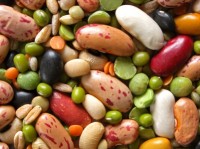Whole Grains, Legumes, Nuts and Seeds – The Importance of Preparation

Whole grains, legumes, nuts and seeds need to be correctly prepared otherwise we risk imbalanced health
There are many benefits from including whole grains, legumes, nuts and seeds in the diet. They are abundant in proteins, healthy fats, vitamins, minerals and fibre and are a good source of energy. When regularly consumed, they can lower the risk of developing diseases like diabetes, cardiovascular disease and obesity. In contrast, frequent consumption of processed grains like refined white flour and polished white rice is a major factor of many health imbalances as they lack fibre and essential nutrients.
.
To gain maximum benefit from eating whole grains, legumes, nuts and seeds they need to be correctly prepared. Inadequate preparation before consumption leads to these nutritious foods becoming challenging and hard to digest with the potential to imbalance health.
.
Unprocessed whole grains, legumes, nuts and seeds are in a dormant state. In nature, the nutrients contained are not released until the right conditions for growth are presented. Adequate water, pH, light and temperature are all important factors for providing the conditions for growth. The right balance of hydration, pH, light and temperature switch the seed from the dormant to the growth state which in turn unlocks nutrients to support the potential life emerging from the seed. Any food processing technique which mimics this process will also unlock nutrients found within whole grains, legumes, nuts and seeds.
.
Unprocessed whole grains, legumes, nuts and seeds also contain anti-nutrients. These anti-nutrients are a protective measure meant to discourage them from being eaten by animals and humans so that the seeds are given a chance to grow. Therefore techniques to lower anti-nutrients in whole grain, nuts and seeds will also be beneficial before consumption.
.
Traditional Methods of Consuming Whole Grains, Legumes, Nuts and Seeds
Historically, many cultures developed food preparation and cooking techniques like soaking, sprouting, roasting and fermentation which made whole grains, legumes, nuts and seeds easier to digest and their nutrients more bio-available to the body. For example, beans were soaked overnight before cooking and wheat was slow fermented before baking. Traditionally, nuts and seeds have also been gently dry roasted which also makes them easier to digest and releases oils which add flavour.
.
In the main traditional cultures have used whole grains but in some refined grains like polished rice have been used. For example traditional Chinese and Indian cultures do not consume brown rice but polished rice. Polishing makes rice easier to digest but removes fibre, minerals and vitamins. To compensate for some of this nutrient loss this type of polished rice is consumed with mineral rich broths or curries made from slow cooked meat, fish, vegetables or pulses flavoured with spices and/or seaweeds. In Western cuisine polished rice is often seen as a replacement for potato and is not eaten with a mineral rich broth or curry.
.
From traditional cooking, the main methods for preparing whole grains, nuts and seeds before consumption include: soaking, sprouting, fermentation and slow cooking. What are the main benefits of these techniques?
.
Benefits of Soaking, Sprouting, Fermentation and Slow Cooking
Soaking
Soaking involves covering whole grains, legumes, nuts and seeds with water. Whole grains and legumes usually require 12 or more hours of soaking whereas nuts and seeds often require shorter soaking times.
Whole grains, legumes, nuts and seeds are dry foods, when they are regularly consumed without soaking they can place an additional strain on digestion. During digestion the body draws on its water reserves as these foods contain very little water. If the body's reserves of water are already low then consuming non-soaked grains, nuts, legumes and seeds places an added burden on digestion, which may lead to the digestive tract becoming irritated or damaged. This form of diet-related dehydration increases the likelihood of digestive imbalances like inflammation and food sensitivities from occurring.
.
Sprouting
Sprouting provides the correct environment for growth and switches the seed from the dormant state to the active growth state. Sprouting reduces anti-nutrients and makes nutrients more bio-available.
Whole grains, legumes, nuts and seeds may be sprouted by pre-soaking them overnight, draining off the water and then leaving in a warm dark place until little tails or sprouts can be seen emerging from the seed. Daily rinsing is required to ensure that the sprouts do not dry out. Sprouting may take a day to a few days depending on the type of seed.
When analysed, the nutrient content in sprouts are significantly greater than the levels found in non-sprouted grains, legumes, nuts or seeds. Consuming the sprout when it has just sprouted maximises its nutrient availability. As the sprout grows, its available nutrients are utilised to support its growth therefore older sprouts will have lower nutrient levels than younger sprouts.
.
Fermentation
Fermentation is another process using yeasts and bacteria to pre-digest the carbohydrates in whole grains, legumes, nuts and seeds. Whole grains, legumes, nuts and seeds are easy to ferment just add a spoonful of baker's yeast, kefir or yogurt to them when you're soaking them. Cover and leave overnight then discard the soaking water and rinse the fermented whole grains, legumes, nuts or seeds before using.
Individuals with weaker digestion may benefit from consuming nuts, seeds and grains prepared in this way.
.
Slow Cooking
Slow, gentle heat cooking helps to breakdown some anti-nutrients, hard to digest carbohydrates and fibre.
It is beneficial to combine the techniques to maximise nutrient availability. Therefore preparing whole grains by pre-soaking/fermenting followed by long gentle cooking helps to improve their digestibility. This is particularly a good method when preparing legumes (beans, peas, whole lentils) which often cause spasm, cramp and gas when not prepared in this way.
.
Methods for Reducing Anti-nutrients within whole grains, legumes, nuts and seeds
Phytates are one of the main anti-nutrients found within whole grains, nuts and seeds. Phytates are compounds containing phosphorous which also attract and bind onto valuable minerals like calcium, iron, magnesium, zinc, and manganese.
As many of the minerals found within whole grains, legumes, nuts and seeds bind to phytates a method to break down phytates and release the minerals is required. Fortunately whole grains, nuts and seeds also contain the enzyme phytase which under the right conditions breaks down phytates and releases the minerals. This enzyme requires an acidic pH and suitable temperature to break down phytates.
.
Some whole grains, legumes, nuts and seeds contain higher levels of phytase (whole wheat, whole rye) where as others contain lower levels of phytase (brown rice, whole grain millet, oats). Therefore different preparation techniques are used to break down phytates depending on the different levels of phytase found within the whole grain, legume, nut or seed.
.
High Phytase containing whole grains (whole wheat, whole rye, and whole barley)
Soak whole grains, nuts and seeds containing higher levels of phytase by adding something acidic like buttermilk, yoghurt etc to the soak water. The acid encourages the enzyme phytase to break down phytates. This form of soaking releases minerals like calcium, magnesium and zinc bound within whole grains, nuts and seeds making them available for absorption by the body.
.
For example, traditional bread making involves soaking whole wheat flour in an acid medium such as buttermilk or apple cider vinegar. The acid provides the correct pH for the enzyme phytase found within whole wheat to break down phytates. The acid soaking is followed by a longer fermentation period than in modern bread making, which results in a loaf which is easier to digest and the minerals being more bio-available. Traditional sour dough preparation of bread involves a long fermentation period in an acidic medium which breaks down phytates found within whole wheat. Sour dough bread preparation is therefore less likely to cause sensitivities than modern bread.
.
In contrast modern bread is not prepared by pre-soaking the flour and has a short fermentation period. The resulting bread is more challenging to digest and has more minerals bound to phytates making them unavailable for absorptions. I believe that this difference in modern whole grain preparation is a significant factor contributing to the increasing sensitivity to whole wheat and gluten.
.
Acid Medium Soaking Formula
1 cup whole grain: Use 2 table spoons acid medium (vinegar, lemon, yoghurt)
1 cup whole grain flour: Use 1 table spoon acid medium (vinegar, lemon, yoghurt)
.
Low Phytase-Containing Grains: (Brown rice, millet, corn, oats, sorghum)
Grains containing lower levels of phytase like whole grain brown rice and millet may be soaked overnight in an acid medium with a higher phytase containing grain like wheat. Add roughly 10% of freshly ground whole wheat grain to the low phytase containing grain.
.
Another method to break down phytates in grains containing low levels of phytase is to use fermentation. Soak the grain with non pasteurised apple cider vinegar or yoghurt and leave overnight.
.
Summary
Soaking, sprouting, fermenting and slow cooking all help to reduce the phytate levels found in whole grains, legumes, nuts and seeds. These methods will not completely remove phytates but will keep levels down. Don't get too worried over the remaining phytates in the diet as keeping some phytates in the diet has some benefit. Phytates also attract and bind to unbeneficial compounds like mercury and heavy metals whilst in the digestive tract. Therefore it makes sense to leave some phytates in the diet.
.
Everybody knows about eating more unrefined grains, nuts and seeds but we also need to include the correct preparation techniques or we risk health imbalances. Most modern food preparation have left out the important traditional steps to save time and money resulting in food which is harder to digest, lower in available nutrients and more likely to cause digestive imbalances. If we adhere to some of the ancient wisdom during food preparation we can all benefit from better level of nutrition from our food.
.




